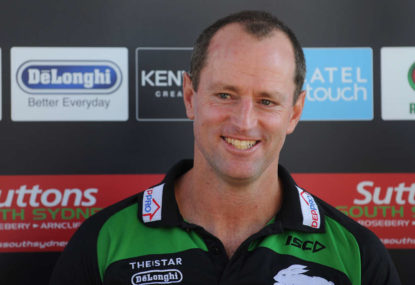NRL News: Richo knocks back Souths to ink long-term Tigers deal, kick-offs 'close to a change soon'
Shane Richardson has inked a four-year deal to lead the Wests Tigers, confirming himself in a permanent role after taking the CEO's job on…

The World Club Series was entertaining, enthralling and finally a touch deflating as it showed a gap remains between the NRL and Super League.
The expanded six-team, three-game mini-comp in the UK, the first of its kind for almost two decades, took place over the weekend. St George Illawarra beat Warrington 18-12, Brisbane pipped Wigan 14-12 in golden point and Souths smashed St Helens 39-0.
The three matches dished up some intriguing contests, big hits, controversy and some good, tough rugby league, as well as an old-fashioned arse-whooping. What more could you want?
I was at the Dragons versus Warrington game on Friday night, an absorbing encounter that was fun to watch. The match was marred by some terrible refereeing, which hamstrung the Wolves’ chances, but ultimately the kicking game of Benji Marshall proved to be the difference between the two sides.
All who were there would say this was no trial match, no meaningless game but one played with passion and pride.
The same can be said for the Broncos versus Warriors fixture on Saturday. Played on a bog of a pitch, this was another niggly, physical affair that also entertained. These two great clubs have a long history together and it was nice to seem them slug it out and go set for set into extra-time.
Joe Burgess kept Wigan alive with a score-tieing try in the dying stages but then a golden-point penalty to Corey Parker sealed the victory for the Queenslanders. Again there wasn’t much between the NRL and Super League sides.
But Sunday night was a different story. Saints were completely outclassed by an impressive South Sydney, who were happy to score at will and snuff out any attacking chance of their opponents.
The Rabbitohs win confirmed them as world champions and was the fourth trophy they have won in four months. Not bad at all.
So what to make of all this?
All three games were played in near full stadiums, with crowds bigger than what those Super League clubs usually attract. Talking to players and coaches, from both sides, they enjoyed being a part of the World Club Series and want to see it retained.
Players from other Super League outfits are keen to be involved. Rugby league in the UK got a shot in the arm, attracted more media coverage than normal and added some extra interest two rounds into the Super League campaign, and two weeks before the NRL season kicks off.
From the neutral point of view the action was decent and you got the sense that there really was something on the line in these games. This concept gives all the players something new to aim for, another facet to the international stage, which is rugby union’s top selling point.
Sure, there were some disadvantages, such as the interpretation of the rules. Both the NRL and Super League have different laws, ridiculous really when they are the only two professional rugby league leagues in the world, and this meant there was some confusion.
The ruck was a bit of a mess and there were quite a few questionable calls. We needed the three best officials in the world to run things, not just three referees. But it was nothing that can’t be fixed.
What set the Australian teams apart from their English rivals was their ability to take the right option under pressure, their superior kicking games and their defence.
The NRL sides know how to slow the play-the-ball down perfectly, but the art of the wrestle has yet to catch on properly in the UK. Defences are also softer in the less-structured English competition, while high completion rates and defensive strength rate highly Down Under.
The World Club Series was played at a high intensity, something the NRL clubs were used to, but the Super League outfits were not. They can only be better for the experience and use it as a learning curve.
Many will criticise the World Club Series as a waste of time, as being one-sided, predictable, unnecessary etc etc. But I believe it has merit and can be an important cog in the international game.
It builds on the 2013 World Cup, which was highly entertaining, and the 2014 Four Nations, which surprised many with its high-quality footy. Sure it has some teething problems, but let’s not bury it before it has time to breathe.
Follow John Davidson on Twitter @johnnyddavidsonhnnyddavidson